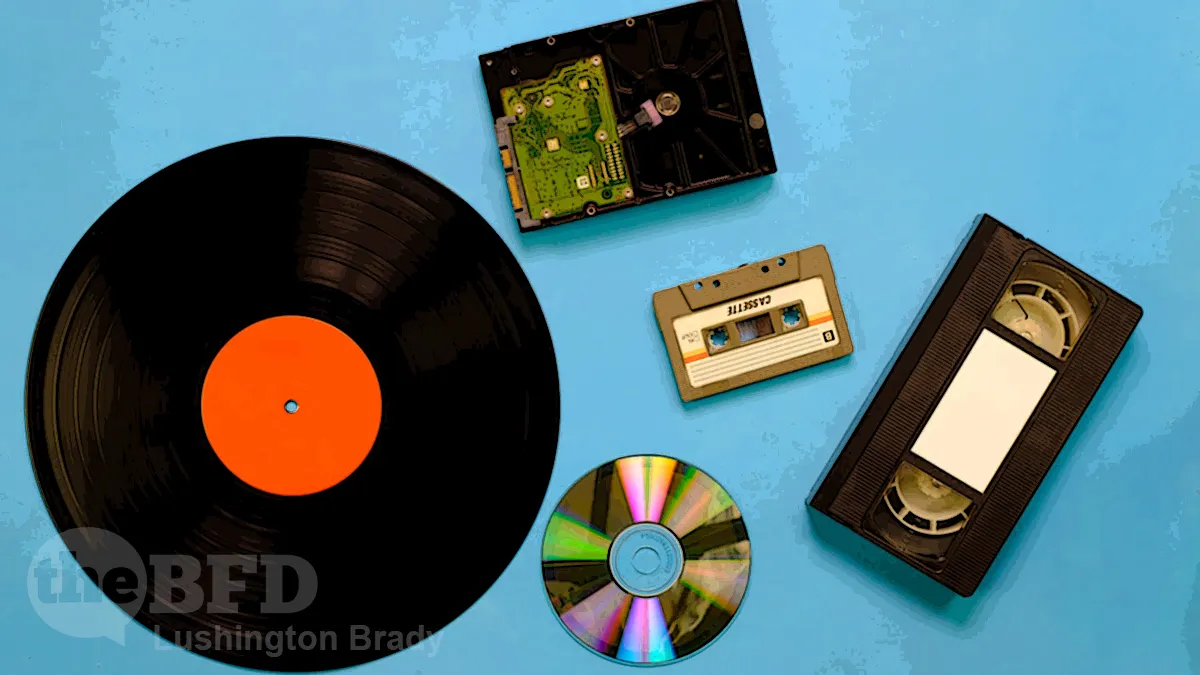Table of Contents
It’s quite often said that people got rid of their records and bought CDs, now they’re getting rid of their CDs and buying records.
I never did either. I kept all my records and bought CDs. In fact, I bought a bunch of records at bargain prices when people threw them away. Nowadays, I’m finding some great bargain CDs.
I have a massive library of digital music, too, but if it’s something I really like, I’ll buy it on physical media. Similarly, I have a Kindle and Amazon Kindle Unlimited subscription — and a literal library, which I continually add to with books I particularly value.
Similarly, despite subscribing to a number of streaming services, my son in particular, makes a point of buying his favourite movies on 4K ultra-high definition discs. My son is not alone as a young person switching to physical media.
[Leslie Haworth] reckons he has 4,500 DVDs, Blu-rays and higher quality 4K Ultra High Definition discs filed alphabetically in custom-built floor-to-ceiling shelves in his apartment, easily reachable with a library-style ladder. (The only exception to his meticulous filing is that classics from the Criterion Collection are ordered by spine number.)
“A lot of them are not on streaming services,” he says. “In Australia, we get the raw end of the deal as far as a lot of licensing agreements go.”
Part of it is simply the tactile experience of holding it in your hand. It’s why I always loved physical music media: not just vinyl, but cassette and CD. Heavily involved in the 80s hardcore scene as I was, tape-swapping was an integral experience. Of them all, though, the vinyl record remains my favourite: perhaps size really does matter.
Haworth agrees with the theory that owning a physical copy of a film, a TV series or even a vinyl record is a deeper emotional connection to the content than just watching or listening on a streaming service […] But there is another attraction to owning a physical copy of a favourite film.
Permanence.
Primarily, though, the quality beats anything on streaming, hands-down. But, yes: it can never be altered at the whim of a streaming server. For example, some classic movies simply aren’t available. Others have been bowdlerised, because they allegedly offend modern sensibilities. If you have it on physical media, you have it forever.
Haworth avoids what’s been dubbed “streaming anxiety” – the fear of losing movies, TV shows and music you’ve bought that are stored in the cloud […]
Whenever there is a report about someone’s expensive collection being wiped out by a change of format or the end of a rights deal, it adds to streaming anxiety.
This month, it was Telstra TV Box Office customers being told they would lose access to films and TV shows they have bought when it shuts down next month unless they switch to another service, Fetch.
We should have learned from 1984. Not the dystopian future within the novel (although that holds many stark lessons), but what happened to an unauthorised copy sold through Amazon. It was removed, not just from Amazon’s servers, but remotely from the devices of anyone who’d bought it. If it can be done to an unauthorised copy, it can be done to a genuine one, as well.
Of course, as happened in the 90s, the normies are slower to catch on.
Even though there are signs of a boost in physical media sales, the rise of streaming services and websites that rent and sell digital movies has seen Australian spending on DVD and Blu-ray fall from more than $800 million in 2016 to just $111 million last year.
Even JB Hi-Fi , the dominant retailer now that the likes of Big W, Target and K Mart have scaled back, has reported that combined movies, music and games software accounted for just 4.2 per cent of total sales in the first six months of this financial year – down from 16.1 per cent in 2014-15.
Give it a decade, perhaps, and the “DVD revival” will be all the rage.
Haworth […] is so keen on physical copies that he needs a battery of machines to play overseas and superseded formats […] “Then I’ve got a VCR, for stuff that never made it off VHS, that will also play US tapes.
The Age
This will be the other great story of the future: at present, VHS tapes are being “recycled” — that is, crushed and destroyed. Perhaps most of the straight-to-VHS stuff is of little worth. But the same was no doubt true of the thousands of pre-1950s nitrate films, especially silent movies, now lost forever. It’s estimated that some 75% of silent films are lost. Many were probably rubbish, but apparent classics have also been lost. Nearly all the films of Theda Bara, for instance. Or Tod Browning’s London After Midnight.
And they’ll prise my VHS copy of Meet the Feebles out of my cold, dead hands.









